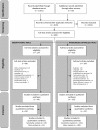Antidepressant response in major depressive disorder: a meta-regression comparison of randomized controlled trials and observational studies
- PMID: 21687681
- PMCID: PMC3110792
- DOI: 10.1371/journal.pone.0020811
Antidepressant response in major depressive disorder: a meta-regression comparison of randomized controlled trials and observational studies
Abstract
Background: To compare response to antidepressants between randomized controlled trials (RCTs) and observational trials.
Methods and findings: Published and unpublished studies (from 1989 to 2009) were searched for by 2 reviewers on Medline, the Cochrane library, Embase, clinicaltrials.gov, Current Controlled Trial, bibliographies and by mailing key organisations and researchers. RCTs and observational studies on fluoxetine or venlafaxine in first-line treatment for major depressive disorder reported in English, French or Spanish language were included in the main analysis. Studies including patients from a wider spectrum of depressive disorders (anxious depression, minor depressive episode, dysthymia) were added in a second analysis. The main outcome was the pre-/post-treatment difference on depression scales standardised to 100 (17-item or 21-item Hamilton Rating Scale for Depression or Montgomery and Åsberg Rating Scale) in each study arm. A meta-regression was conducted to adjust the comparison between observational studies and RCTs on treatment type, study characteristics and average patient characteristics. 12 observational studies and 109 RCTs involving 6757 and 11035 patients in 12 and 149 arms were included in the main analysis. Meta-regression showed that the standardised treatment response in RCTs is greater by a magnitude of 4.59 (2.61 to 6.56). Study characteristics were related to standardised treatment response, positively (study duration, number of follow-up assessments, outpatients versus inpatients, per protocol analysis versus intention to treat analysis) or negatively (blinded design, placebo design). At patient level, response increased with baseline severity and decreased with age. Results of the second analysis were consistent with this.
Conclusions: Response to antidepressants is greater in RCTs than in observational studies. Observational studies should be considered as a necessary complement to RCTs.
Conflict of interest statement
Figures


References
-
- Turner EH, Matthews AM, Linardatos E, Tell RA, Rosenthal R. Selective publication of antidepressant trials and its influence on apparent efficacy. N Engl J Med. 2008;358:252–260. - PubMed
-
- Walsh BT, Seidman SN, Sysko R, Gould M. Placebo response in studies of major depression: variable, substantial, and growing. Jama. 2002;287:1840–1847. - PubMed
-
- Posternak MA, Zimmerman M. Therapeutic effect of follow-up assessments on antidepressant and placebo response rates in antidepressant efficacy trials: meta-analysis. Br J Psychiatry. 2007;190:287–292. - PubMed
Publication types
MeSH terms
Substances
LinkOut - more resources
Full Text Sources
Medical

